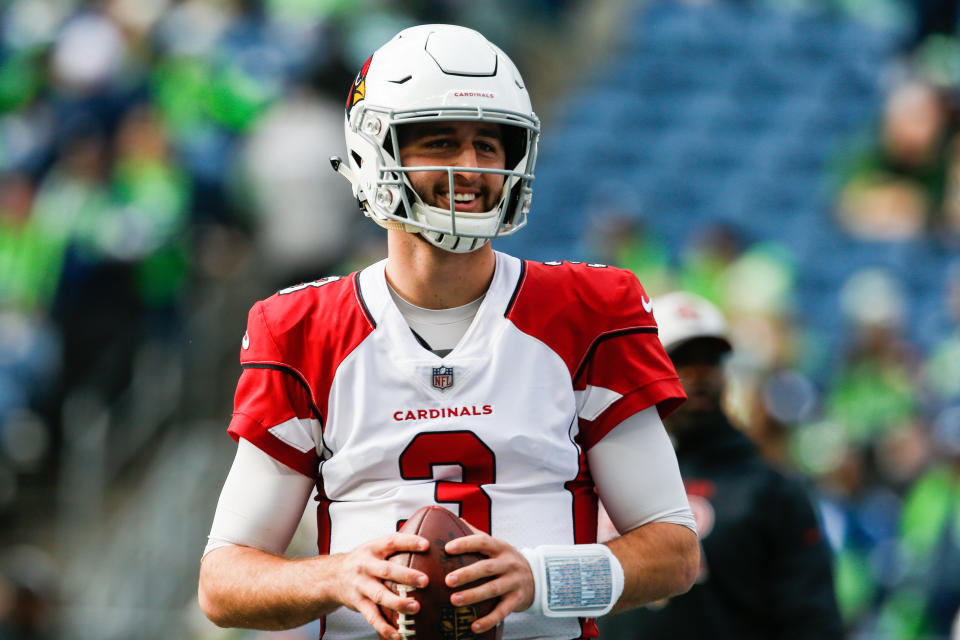A response to Kliff Kingsbury's hire with Cardinals: 'What is pro football coming to?'
In December, when the Arizona Cardinals were contemplating their future and how to best develop quarterback Josh Rosen, pressing questions began to tilt the franchise away from head coach Steve Wilks.
Where is the league going and how can we keep up?
The Cardinals didn’t need to search long for answers. The regular-season schedule in 2018 was enough of a reminder. The future of the NFC West was apparent in a pair of thumping losses at the hands of the Los Angeles Rams and coach Sean McVay. Not to mention the renewed threat of the San Francisco 49ers, who will again pair together coach Kyle Shanahan and quarterback Jimmy Garoppolo in 2019. As for the wider league outlook, Arizona could see it in Kansas City Chiefs quarterback Patrick Mahomes. Or the offensive development of the Chicago Bears under coach Matt Nagy.

If you’re looking for a reason why the Cardinals fired Wilks after only one season and replaced him with Kliff Kingsbury, start with that 2018 schedule and what it said to the Cardinals. It had everything to do with reaching for offensive creativity, maximizing quarterback development and securing someone who could be paired with Rosen in a long-term effort to achieve both. Whether it was right or wrong, Wilks wasn’t seen as the decade-long answer to ownership. And Kingsbury? Well, despite a 35-40 record at Texas Tech, he appeared to be the gamble the franchise couldn’t pass up.
This is why Kingsbury landed the Arizona job. The same reason why the franchise was intrigued in him as a candidate since December. Because ownership believes the development of Rosen and the ability to go stride-for-stride in an offense-driven NFL should be the team’s top priority. And if it isn’t, then Arizona is risking the best opportunity to build a Super Bowl team since it signed Kurt Warner in 2005. That’s what the Cardinals believe is at stake here.
This will be called “group think” of course. It will be called a lack of original thought or the typical copycat atmosphere that overtakes NFL franchises. Those criticisms may be both fair and right. But in the minds of Cardinals ownership, the NFL is largely built on success replication. It’s why the league has “eras” that are dominated by certain types of defenses or a particular brand of positional dominance. More often than not, NFL success is often achieved through the theft of ideas. How many championships have been won by West Coast offenses since 1980? Why are so many quarterbacks running offenses that call for a litany of shotgun snaps or spread sets? Why is the nickel package the most popular base defensive set in the league?
Someone figured out that it works. And it’s easier to swim with the current than fight it for a decade while searching for true innovation that may never come.
This is why so many teams are looking for McVay or Kyle Shanahan or some iteration of an offensive coach who can make sure the quarterback software is up to date. Those guys might be unicorns and impossible to replicate, but with a league creating rules to facilitate offense, even the thought of finding a unicorn can move mountains.
And that’s what it did for Kingsbury. Enough so that when he lost his job at Texas Tech, no fewer than four extremely bright minds all reached out to him for some type of conversation or encouragement, or simply to pick his brain. We’re talking about McVay, the Chiefs’ Andy Reid, the New Orleans Saints’ Sean Payton and then-Miami Dolphins coach Adam Gase. The New England Patriots’ Bill Belichick? He would have loved nothing more than to get Kingsbury into his building to watch some film and discuss offensive concepts.

That all meant something to the Cardinals. Just like it meant something that Kingsbury had a hand in the development in a litany of NFL quarterbacks, from Mahomes to the Cleveland Browns’ Baker Mayfield to former first-round pick Johnny Manziel to Denver Broncos starter Case Keenum and New York Jets backup Davis Webb. That’s a lot of NFL talent that helped pave the way to Kingsbury posting five top-five finishes in scoring offense in the college ranks, split between multiple stops as an offensive coordinator and head coach. And maybe most impressive, Kingsbury’s offenses were rarely static. He changed elements to fit players and skills. He augmented schemes to fit the tools at hand. It’s the kind of thing that gets you noticed on all levels of football.
Does it mean it will translate to NFL success for Kingsbury? No. Is it worth a roll of the dice on a head-coaching position? Maybe not. Is it fair to fire Wilks after one season for such a definitive gamble? Well … that all depends on what you believe Rosen is and where his ceiling could take the rest of the franchise.
Maybe the only thing for certain in this kind of hire is questions and raised eyebrows, and some coaching candidates and front offices that feel like the league is reaching too far too fast.
As one head-coaching candidate from this year’s crop said in a text after the Kingsbury hire: “Wow! What is pro football coming to? I’m just at a loss for words.”
What is pro football coming to?
The Cardinals believe they’re looking squarely at that question. They also believe Kliff Kingsbury is their answer. Now we get to see if one of the league’s most improbable gambles can justify that confidence.
More from Yahoo Sports:
• Forde: Puzzling play calls, bad turnovers: Inside Saban’s night of incompetence
• Imagine Dragons gets roasted after halftime show
• Thamel: Trevor Lawrence’s ascendance complete with title showcase
• Mugger targets UFC’s Polyana Viana, immediately regrets it

